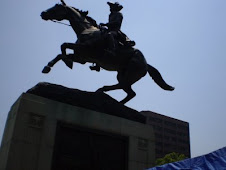The new Elizabethan Age
I see Cate Blanchett will be playing Elizabeth I again in the upcoming Elizabeth, The Golden Age. This comes on the heels of Helen Mirren's HBO series and Showtime's series, "The Tudors," which is actually about Henry VIII, Elizabeth's father.
I haven't seen either of those shows, but will probably do so eventually--though I've got to say that the guy playing Henry VIII looks a little too lean and dark for the part. (This review says the actor is better suited to play "a scheming courtier or pining poet than an extroverted royal peacock.") But I do like me some Tudors, especially Elizabeth.
I saw Blanchett's first Elizabeth film and liked it very much. It wasn't exactly historically accurate, but that doesn't bother me overmuch. Elizabeth was such a fascinating character that I always find it interesting to see how others view her. Though I hold no truck with those who sympathize with Mary, Queen of Scotts. Mary Stuart was a royal pain in the ass and Elizabeth allowed her to stick around for far too long. The new movie, I see, will touch on that. Here's the trailer:
And here, just for kicks, is a rundown of movies about Elizabeth with pictures.
As it happens, I'm enjoying an Elizabethan renaissance myself. I've been watching "Elizabeth R," the BBC series starring Glenda Jackson, who really embodies Elizabeth--in my humble opinion. I first watched the series a gazillion years ago when it first aired on "Masterpiece Theater." I loved it then and kind of wondered how it held up. It did. Jackson is superb, as is the supporting cast, the costumes are terrific and the makeup is great. Here are some photos of Jackson being made up as Elizabeth.
I'm also reading Paul Johnson's book, Elizabeth I: A Study in Power and Intellect, which was published in 1974 before, I think, Johnson became famous over here. It's not really an authoritative biography-Johnson skips around a lot, which can get kind of confusing--but I'm enjoying it. I like Johnson's brisk style. And I like that he quotes a lot from primary sources. He portrays Elizabeth as a conservative who, though desperate for cash, was reluctant to raise money through taxes.
It was not a method of raising money she exploited but rather, to her mind, a monarchical privilege which was to be used sparingly. Direct taxation cost her popularity, and employing it had therefore to be balanced against the necessity to furnish the Exchequer. She was as reluctant to raise money as to spend it. Whenever possible, she turned to other methods. ... In 1591 there was a more bizarre effort: negotiations with Edward Kelly, a medium ... [who] had been experimenting in the transmutation of base metal into gold ... ELizabeth was skepical of Kelly's powers, but determined, if they existed, that they should be used in the service of England ...
If sometimes, as Ralegh complained, she underfinanced her war policies, she maintained political solidarity and economic expansion by keeping the English the lowest-taxed nation in Europe, a fact to which Bacon paid tribute: 'He that shall look into other countries and consider the taxes, and tallages, and impositions, and assizes and the like that are everywhere in use, will find that the Englishman is most master of his own valuation and the least bitten in purse of any nation in Europe.'
But Elizabeth was no neocon; she didn't seek out war, but was forced into it by circumstances, as when she--after much prodding by her advisors--sent then-favorite Robert Dudley, Earl of Leicester to the low countries to defend Protestant interests. War could be very expensive.
Even by the somewhat bizarre standards of sixteenth-century warfare, Leicester's personal entourage gave his army a top-heavy appearance. We possess a list of over 1,100 persons forming what was called his 'train'. ... Moreover, Leicester himself was surrounded by a household a monarch might have envied: his personal suite comprised 99 gentlemen-officers, yeomen and their servants and over 70 lords, knights and gentlemen; he had a steward, 4 secretaries, 2 engineers, pages, grooms, trumpeters, footmen, chaplains, physicians and a whole company of actors. The vast quantities of baggage included no less than 44 beds for the kitchen staff alone.











No comments:
Post a Comment